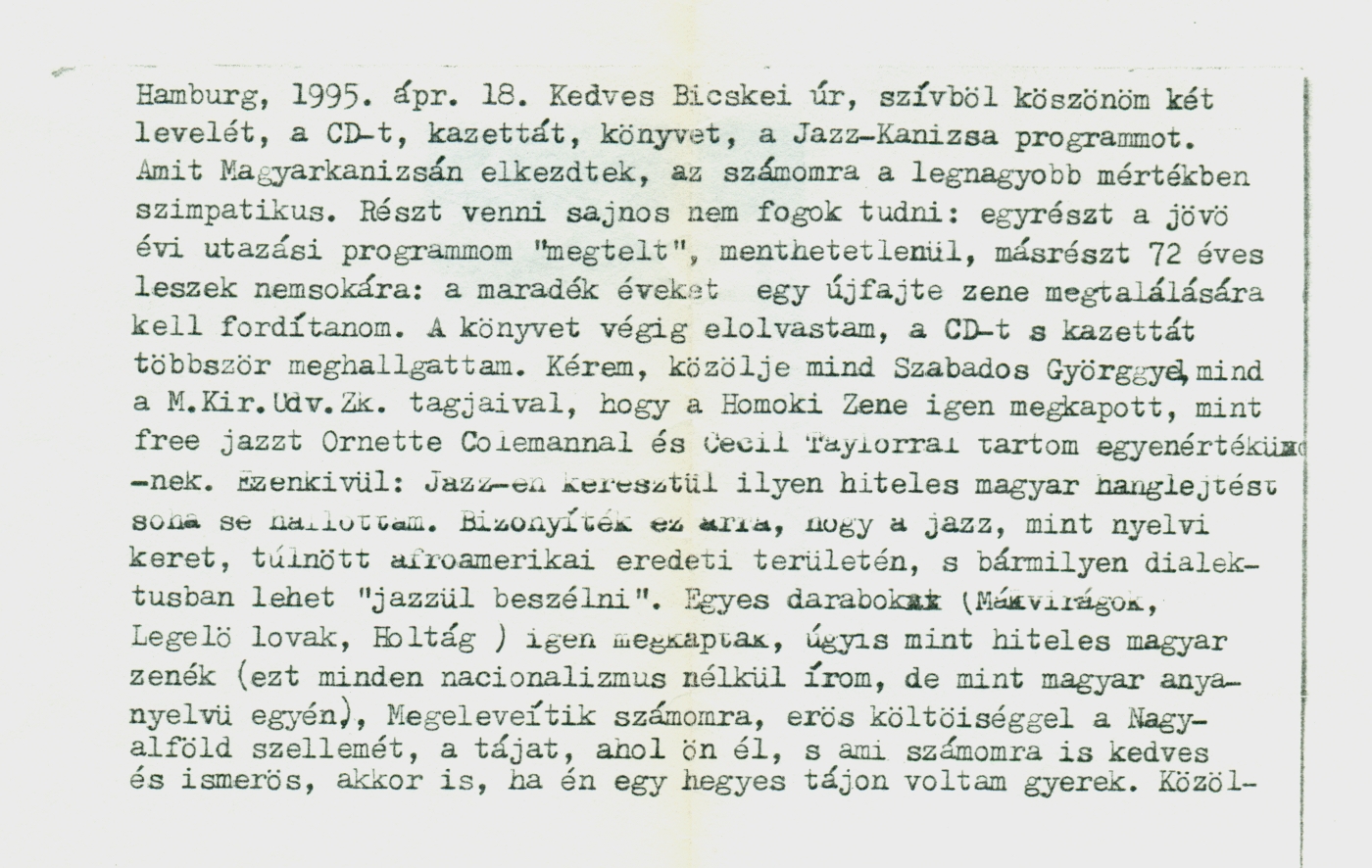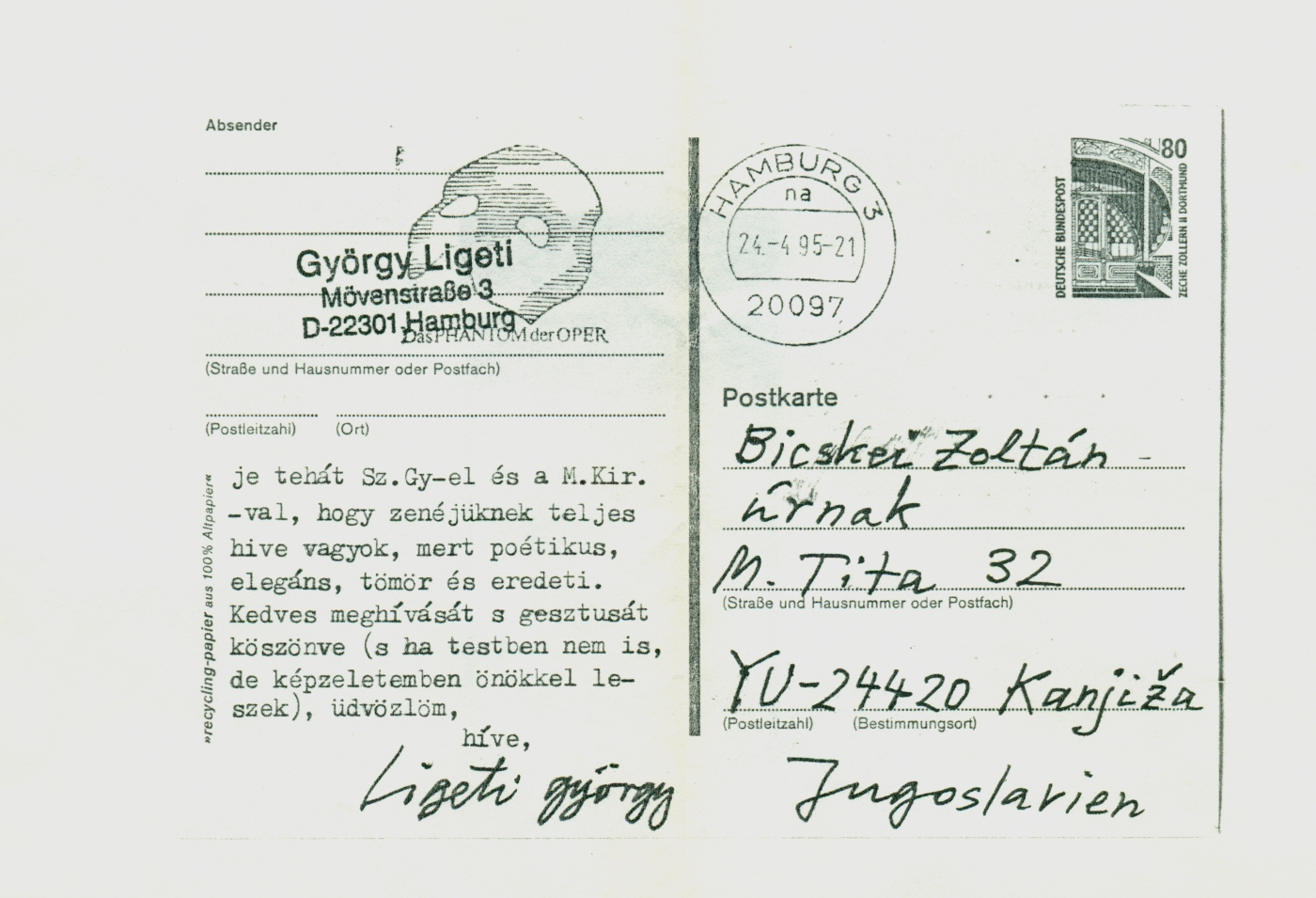György Ligeti – postcard from 24.04.1995 about CD: Homoki Zene (Sands Music):
Hamburg, 18th April 1995
Dear Mr. Bicskei, I thank you for your two letters, the CD, the tape, the book and the program of Jazz-Kanizsa. What has been launched in Magyarkanizsa, is for me most likeable. Unfortunately, I won’t be able to be present: on the one hand, my next year’s travel program is “fully booked out”, beyond saving it, on the other hand, I will be soon 72 year old. I have to spend my remaining years with the effort to find a new kind of music. I read the book and I listened several times to the CD and the tape. I ask you to tell both Mr. György Szabados and the members of the M.Kir.Udv.Zk. (Hungarian Royal Court Orchestra) that the Sand Music (sand here is rather a geographic reference to the sandy soil of the Great Hungarian Plain) touched me emotionally; as free jazz, I consider it equivalent to Ornette Coleman and Cecil Taylor. Besides: I have never heard such an authentic Hungarian tone (transmitted) through jazz. This proves that jazz as a linguistic frame has grown beyond its original Afro-American area and it is possible to talk the “jazz language” in whatever dialect. Certain pieces (Mákvirágok Poppies, Legelő Lovak Grazing Horses, Holtág Oxbow Arm) strongly affected me emotionally, also in their quality of authentic Hungarian music (I tell this without any nationalism, but as someone speaking Hungarian as mother-tongue). With powerful poesy they revive for me the spirit of the Great Hungarian Plain, the landscape where you are living and which is for me dear and known, even if I spent my childhood in a hilly region. Please tell to Gy.Sz. and the M.Kir. that I am fully devoted to their music because it is poetic, elegant, compact and authentic. Thanking for your kind invitation and gesture (if not physically but in mind I will be with you), I remain with friendly greetings,
György Ligeti
(Translation by Tharan Marianne)
György Ligeti – Postkarte vom 24.04.1995 zur CD: Homoki Zene (Sands Music):
Hamburg, den 18. April 1995
Lieber Herr Bicskei, herzlichen Dank für Ihre zwei Briefe, die CD, die Kassette, das Buch und das Jazz-Kanizsa Programm. Was Sie in Magyarkanizsa angefangen haben, ist für mich höchst sympathisch. Ich werde daran leider nicht teilnehmen können: erstens ist mein Reiseprogramm im nächsten Jahr „voll ausgebucht“, da ist nichts mehr zu retten, andererseits bin ich bald 72 Jahre alt: die restlichen Jahre muss ich damit verbringen, eine neuartige Musik zu finden. Das Buch habe ich bis zum Ende gelesen, die CD und die Kassette mehrmals gehört. Bitte, teilen Sie Herrn György Szabados und den Mitglieder des M.Kir.Udv.Zk. (Ungarisches Königliches Hoforchester), dass ich von der Homoki Zene (Sandmusik – Sand als Anspielung auf den Sandboden der Grossen Ungarischen Tiefebene) sehr berührt war; ich halte sie als free jazz gleichwertig mit Ornette Coleman und Cecil Taylor. Außerdem: ich habe so einen authentischen ungarischen Tonfall durch Jazz (vermittelt) noch nie gehört. Dies beweist, dass der Jazz als sprachlicher Rahmen, über sein ursprüngliches afroamerikanisches Gebiet hinaus gewachsen ist und es möglich ist in jeglichem Dialekt „Jazz zu sprechen“. Einzelne Stücke (Mákvirágok Mohnblumen, Legelő Lovak Weidende Pferde, Holtág Altwasserarm) haben mich sehr berührt, auch als authentische ungarische Musikstücke (das sage ich ohne jeglichen Nationalismus, aber als jemand mit ungarischer Muttersprache). Durch eine starke Poesie beleben sie für mich den Geist der Grossen Ungarischen Tiefebene, die Landschaft, wo Sie selber leben, und die auch für mich lieb und bekannt ist, auch dann, wenn ich meine Kindheit in einer Berglandschaft verbracht habe. Teilen Sie also Herrn Gy.Sz. und dem M.Kir., dass ich mich zu ihrer Musik völlig hingezogen fühle, weil sie poetisch, elegant, kompakt und authentisch ist. Für Ihre liebe Einladung und Geste dankend (auch wenn nicht körperlich, aber in Gedanken werde ich bei Ihnen sein), grüsse ich Sie, mit Freundschaft,
Ligeti György
(Translation Tharan Marianne)

